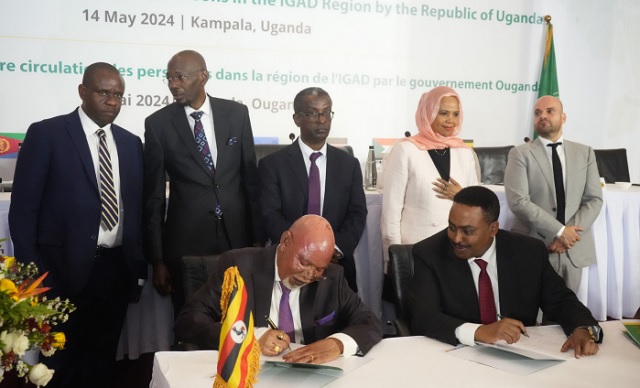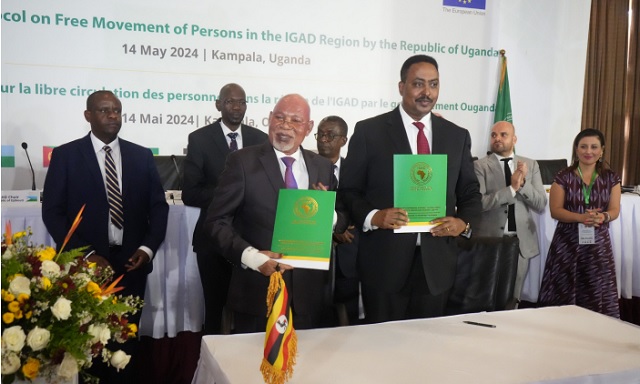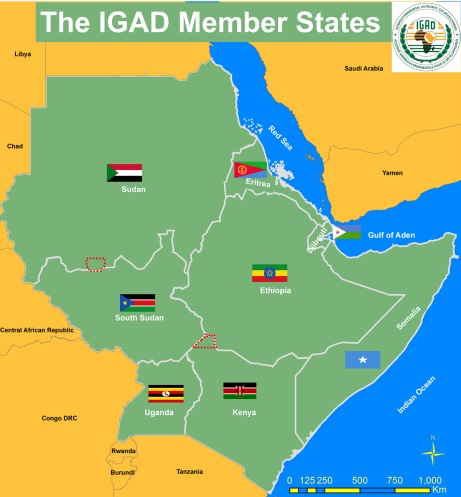

What to anticipate from Uganda signing IGAD Protocol
COVER STORY | RONALD MUSOKE | Uganda has lastly signed the Intergovernmental Authority on Improvement (IGAD) protocol that enables lawful free motion out and in of residents of the international locations of the East and Horn of Africa area.
By signing of the Protocol on Could 14 in Kampala, Uganda signaled that it intends to facilitate the secure and orderly motion of its residents and people of the IGAD bloc.
On the signing ceremony that came about at Serena Worldwide Convention Centre in Kampala, Uganda’s Minister of International Affairs, Gen. Jeje Odongo, appropriately instructed the delegates that the IGAD member states are “really late” in implementing the protocol on free motion of residents throughout the bloc.
“When the IGAD was based in 1986, there have been directions to implement this protocol,” Gen. Odongo mentioned, “To take motion so a few years after that instruction is slightly late however they are saying ‘higher late than by no means.”
Gen. Odongo mentioned Uganda made signing the protocol a precedence as a result of the African Union designated President Yoweri Museveni as a “champion of regional integration” which is an aspiration of the continental organisation.
“We should take a look at all devices, take a look at all prospects to carry us collectively in order that we are able to be capable to commerce amongst ourselves, work peacefully amongst ourselves and be capable to transfer labour throughout borders with ease,” he mentioned.
It now stays to be seen how Gen. Odongo’s lofty rhetoric and President Museveni’s distinction as a Pan-Africanist will translate into the free motion of individuals within the IGAD area.
The IGAD bloc includes eight international locations from the Horn and japanese a part of Africa, specifically; Uganda, Kenya, Somalia, South Sudan, Ethiopia, Sudan, Djibouti and Eritrea. Uganda turns into the fifth IGAD member to signal the Protocol. That leaves Djibouti, Eritrea and Kenya to approve the protocol.
Uganda’s signing of the IGAD Protocol comes six years for the reason that African Union Free Motion of Individuals protocol was endorsed by the continental apex group. It additionally comes 11 years for the reason that East African heads of state signed an settlement for the elimination of mobility restrictions of residents in 2013.
So far, though residents of Uganda, Kenya, and Rwanda can cross borders utilizing their nationwide id playing cards, Tanzania and Burundi require them to current a passport.
There’s optimism round Uganda’s signing of the IGAD protocol as a result of it comes on the again of a slew of state initiatives in the direction of free mobility of individuals. The Africa Visa Openness Report 2022 confirmed that 27% of all intra-African journey routes require no visa in any respect for residents of African international locations. That is up from 25% in 2021 and 20% in 2016. In 2022, 24 African international locations (over 40%) provided eVisas to Africans, up from 9 African international locations in 2016.
Then there was the push across the African Continental Free Commerce Settlement (ACFTA) to cut back obstacles to Africans crossing African borders. Recently, additionally Kenya, Rwanda and Uganda have made strikes that sign elevated openness to free motion of residents. These international locations now supply proper of residence and proper to work for his or her residents throughout the three states.
Why concern of free mobility?
The IGAD bloc straddles a geographical space of about 5.2 million sq. km and has a inhabitants of about 300 million individuals. The bloc has been described as an space of “individuals on the transfer” by the ‘The State of Migration in East and Horn of Africa Report 2022’ that was revealed in Could 2023.
Launched by the Kenyan authorities in partnership with IGAD, the Worldwide Organisation for Migration (IOM) of the UN, and the East African Group (EAC), the report was the primary complete research on mobility dimensions of regional integration within the East and Horn of Africa.
The report identified that whereas a lot analysis focuses on migration from Africa to different areas, notably to Europe and North America, there may be really appreciable motion of individuals throughout the IGAD area.
It famous that in 2020, 68% of the 13 million emigrants from the area moved to a different nation in Africa. Of those, 57% (7.5 million) lived within the IGAD area. “This means that the biggest motion of individuals takes place throughout the area and the continent,” the report mentioned.
The report additional famous that migration and mobility traits within the area are extremely complicated as a result of 87% of the 8.5 million worldwide migrants within the area originated from the area.
Individuals transferring to work symbolize a key part of the mobility, with 4.7 million migrant staff. However 22.3 million individuals are displaced individuals, together with 16.9 million internally displaced individuals and 5.4 million refugees and asylum seekers. However human mobility within the IGAD area additionally entails vital numbers of pastoralists.
“Battle, violence, poverty and climate-related disasters proceed to be main drivers of migration and mobility within the area,” the report mentioned. However freer individuals mobility additionally presents alternative to commerce, make investments, and elevated cultural understanding.
So, confronted with each these grim realities but additionally the immense alternatives, why have some IGAD states remained hesitant to permit residents to maneuver freely throughout their borders?
It’s largely as a result of the richer democratic international locations within the area, akin to Kenya, concern that when they signal the protocol, they are going to be flooded by low-skilled financial migrants from poorer international locations. However there are additionally fears among the many poorer and fewer democratic international locations akin to Eritrea and Djibouti that signing the IGAD protocol might set off political instability as their residents flee to safer states.
This partly explains why, though the IGAD was fashioned in 1986 with emphasis on the protocol on free motion of individuals, majority of states stay hesitant to signal its protocol. 1986 was the peak of a really extreme drought, famine in addition to a desert locust invasion and communal violence in japanese Africa and member states felt threatened.
Nevertheless it was in 2013 that the Summit of the IGAD heads of state and authorities adopted a minimal integration plan to function a roadmap for regional integration, through which the free motion of individuals is a key pillar. Then the protocol was solely permitted by the IGAD member state ministers in command of inside affairs and labour in 2020.
Uganda indicators protocol
Uganda’s signing ceremony was a part of a three-day assembly of IGAD member states that was held within the lake facet city of Entebbe to assessment the progress to this point made with respect to the signing, ratification and domestication of the “protocol on free motion of individuals and transhumance” following the IGAD ministerial assembly held within the Sudanese capital, Khartoum, in February 2020.

The signing came about in Kampala with Gen. Jeje Odongo, Uganda’s Minister of International Affairs, appending his signature on the protocol beneath the watch of Dr. Workneh Gebeyehu (PhD), the IGAD Govt Secretary, Jackson Kafuuzi, Uganda’s Deputy Lawyer Common and State Minister for Justice and Constitutional Affairs, Balaam Barugahara, Uganda’s State Minister for Youth and Kids Affairs in addition to Guillaume Chartrain, the Deputy Head of the European Union Delegation to Uganda.
What protocol means
In accordance with Dr. Gebeyehu, the IGAD Secretary Common, the purpose of the protocol is to realize a progressive realisation of free motion of individuals regime within the IGAD area that’s secure, orderly and useful to the residents of this area. He says this can facilitate choices for safe livelihoods for populations, greater quantity of regional commerce, improved entry to fundamental social providers, and entry unreached marginal communities and improved governance of rural areas by governments.
Gebeyehu additionally notes that the signing of the protocol displays member states’ dedication to meet aspirations enshrined in each the UN and AU coverage frameworks on free motion of individuals and migration on the whole.
Rights throughout the legislation
Lucy Daxbacher, a senior skilled and diplomat at IGAD who has been working carefully on this protocol instructed the media on Could 15 key tenets of the protocol embrace the suitable of entry and exit, proper to reside, proper to work, and proper to determine enterprise and enterprise in any of the member states of IGAD for any of the 300 million residents of the IGAD area.
Daxbacher additionally famous that, owing to the area’s fragile nature, due to each pure calamities and man-made disasters akin to conflict, as is presently the case in Sudan, “Residents will be capable to discover a house wherever they want to discover it in these eight international locations of IGAD.”
She mentioned the IGAD protocol is the one one all over the world that gives alternative to host individuals displaced by pure disasters. She mentioned the IGAD area has outlined migratory routes which embrace the Purple Sea route the place residents traverse desert lands to the Purple Sea and cross into Yemen the place they attempt to attain Saudi Arabia seeking employment alternatives.
The opposite is the path to the Mediterranean Sea by way of Sudan and Egypt or Sudan by way of Libya to the Mediterranean Sea and into the European Union. Then there may be the southern route the place residents attempt to cross into Kenya and proceed to South Africa by way of Tanzania.
“That’s why I’ve famous that this area is on the transfer,” she mentioned, “The IGAD protocol goals to provide residents a secure and common pathway to the identical issues they’re searching for with out them making determined journeys that are very dangerous for them throughout the Mediterranean and Purple Sea.”
The interior alternatives created imply IGAD residents will probably be accorded the identical safety in any member nation identical to the nationwide residents, she mentioned. In the meantime, Daxbacher famous that a lot because the protocol accords free motion of IGAD residents, that doesn’t imply that residents is not going to be topic to nationwide migration legal guidelines.
“The residents who’re transferring in our area should be accountable to the international locations the place they’re travelling or in these international locations that are internet hosting them,” she mentioned, “A free motion regime is not going to and doesn’t condone lawlessness and it doesn’t condone transnational crime.”
“It’s not free to the extent of being lawless, it’s free within the context of full utility of the legal guidelines within the international locations of residence; it’s free within the full context of help and facilitative immigration providers; it’s free within the sense of full utility of proper of firm and proper of residence.
“However the free motion regime will imply efficient governance; efficient governance of our borders; that our immigration providers are on the bottom however not solely to the immigration however built-in border administration the place you’ve the entire broad authorities providers together with; safety, immigration, port well being, veterinary, phytosanitary and intelligence providers.”
Protocol protects weak residents
Agnes Igoye, a migration skilled at IGAD who additionally beforehand labored as Uganda’s negotiator on the protocol instructed The Impartial that the protocol additionally has particular articles that care for the motion of weak communities akin to girls, unaccompanied youngsters, girls in danger and victims of trafficking. “As we speak about free motion, we now have to make it possible for all people who’s on the transfer should transfer safely,” she instructed The Impartial.
“It is a very vital protocol to that impact as a result of generally when individuals suppose free motion; it’s like all people is transferring however, it additionally signifies that our eyes should even be on transnational organised crime.

“We need to make it possible for even weak individuals have alternative; as a result of with victims of trafficking, they’re lied to that there’s a job someplace. Could that job be truthful, might we be capable to information them with data by focusing on them particularly.”
“That signifies that even if you find yourself doing consciousness campaigns for this protocol; you must be focusing on weak populations together with victims of human trafficking. Weak communities are on the transfer they usually have a proper to maneuver however with transnational organised crime or individuals who recruit for illicit functions, you recognize, not solely good individuals transfer but additionally unhealthy individuals transfer.”
“So which means coping with problems with terrorism, drug trafficking, smuggling of immigrants. We would like the motion of individuals inside this area to be humane; that when persons are transferring, their peace shouldn’t be disturbed; that they’re transferring to alternative which really exist; that their rights are being protected on the transfer, as they work or as they go to high school.”
Marginalized pastoralist communities
Japheth Kasimbu, a transhumance skilled at IGAD mentioned the protocol additionally commits member states to take a position extra sources within the frontier zones which have been marginalised for many years.
He was referring to the delicate border areas of japanese Ethiopia/western Somalia, southern Somalia/northeastern Kenya, western Ethiopia/japanese Sudan, southern Ethiopia/northern Kenya, southern South Sudan/northwestern Kenya/northern Uganda in addition to northeastern Uganda/ northwestern Kenya that are primarily inhabited by a number of nomadic pastoralist communities that periodically descend into communal battle over sources (pasture and water).
“Wanting forward, the hope is that these communities will be capable to graduate slowly from the nomadic way of life to a extra established way of life,” Kasimbu mentioned, noting that IGAD’s protocol is “a really progressive protocol because it makes an attempt to carry order to the problems of pastoral cross-border mobility.”
Kasimbu mentioned the protocol has articles that criminalise using weapons because the pastoralists cross the borders; it has articles that additionally mandate the communities themselves to vet the opposite communities coming to graze into their area in relations to the quantity of water and pasture that’s out there.
“The protocol is bringing some sense of order in that Karamoja Hall. I believe it is a well timed framework such that IGAD working with the member states can even carry order into the way in which the cross-border mobility of the cross-border pastoral communities is finished.”
Political dedication wanted
For Guillaume Chartrain, the Deputy Head of the EU Delegation to Uganda, the institution of a free motion regime is a course of that requires robust political dedication from its related members, as politics of regional integration are key to a profitable realisation of the regional free motion agenda.
The EU has been supporting the IGAD beneath a €15 million funding to determine a free motion regime within the area, supporting its regional mandate and convening energy. Chartrain famous that promotion and implementation of deliberate and well-managed migration and labour migration insurance policies within the IGAD area can positively contribute to growth and supply safety for individuals on the transfer.
“Practically thirty years in the past, the European Union adopted the Schengen Settlement, enshrining the precept of free motion for over 425 million EU residents and quite a few non-EU nationals as vacationers, alternate college students, or for enterprise functions.”
“This settlement, by facilitating unrestricted motion throughout the Schengen Space, has considerably bolstered our financial dynamics and fostered a deeper sense of unity and solidarity amongst member states.”
“It’s this very freedom that illustrates the tangible advantages of nearer cooperation, serving as a cornerstone of our integration. This has modified for even the sense of belonging to at least one single entity for tens of millions of EU Residents.”
“As a European citizen, you’ll be able to work, you’ll be able to research and you’ll dwell in all of the international locations of the Schengen Space, one thing which has bolstered each our financial system, our regional integration but additionally the sense of belonging, of being an EU citizen wherever you come from within the Schengen Space.”
Chartrain mentioned that could be a lesson the EU needs to share with its companions not solely inside IGAD but additionally within the different areas of the continent. “We actually imagine in regional integration as a method to assist all international locations to prosper, to develop, share their expertise; that is what we imagine in and that is what we need to share with IGAD.”
